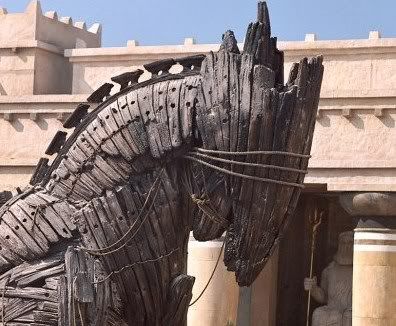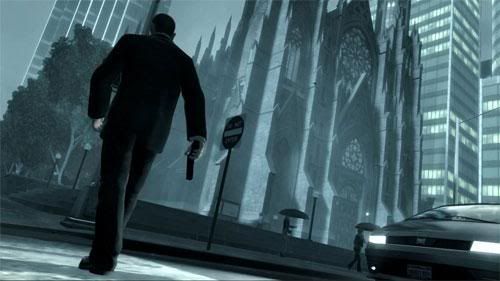
There’s a wonderful moment in Book 8 of the Homeric Odyssey when Odysseus treats one of the two bards in the Odyssey (we’ll meet poor Phemius, the other one, another time) pretty much the way a gamer treats his or her controller, fulfilling the fantasy that herdsman from further down the blog has of being his own bard without the long apprenticeship and the bad wages.
Demodocus [that’s the name of the bard; Odysseus is talking to him here],
I praise you above all mortals.
Either the Muse, daughter of Zeus taught you, or Apollo.
For all too well, in order, you sing the trouble of the Achaeans,
All the things they did and sufered and all the things the Achaeans toiled at,
as if you yourself were there, or heard from another.
But come, change it up, and sing the making of the horse—
the wooden one—the one Epeius made with Athena,
which once heroic Odysseus brought as a trick to the city-center,
having filled it with the men who sacked Troy.
If you tell me this, giving due attention,
immediately I’ll proclaim to all people
that the god willingly awarded you a divine song.
It’s not outside the realm of possibility, though it’s absolutely impossible to prove, that this passage is the origin of the story of the Trojan Horse. If you know the Odyssey, you may instantly be objecting, “But what about Menelaus’ story in Book 4, when he tells of what happened when the horse was inside the gates of Troy, and Helen came down to see it?” The answer to that objection is very revealing: within the framework of oral recomposition of ancient epic, there’s no reason to think that an earlier moment of an epic must have existed when a later moment was composed.
By exactly the same token, it’s interesting to note, a player of GTA4 or any other adventure video game, can and almost always does, use information gained about a later part of the game to change his or her play in an earlier part of the game the next time he or she plays. Indeed, it’s nearly impossible to help it: if you know that a bodyguard with an AK-47 is waiting around the next corner, you aren’t going to charge in there next time, the way you did this time. Your next time through that level will be much more satisfying—much more artistic, even—then it was when you died, or only barely escaped.
At any rate, the reason to wonder whether this passage is the origin of the Trojan Horse is that what Odysseus is asking Demodocus to do is improvise a brand new song to celebrate Odysseus’ glory. In Book 1, Telemachus, talking to his Mom about Phemius, that other bard, tells us that the newest song is always most popular. Odysseus would certainly want, just on the face of it, to have a popular song sung about him.
And strangely enough earlier that day Demodocus has already sung a song that involves Odysseus. That one wasn’t about Odysseus alone, though—it was about how Odysseus and Achilles had a quarrel, and showed the two of them (Achilles is the great warrior-hero of the Iliad, you remember) on a more-or-less equal footing. In case you’re interested in this kind of detail, we don’t have the slightest bit of evidence that anyone other than the fictional Demodocus actually sang such a song, and classicists remain a bit mystified about why the real singer of the Odyssey would have his idealized self-portrait, Demodocus, sing such a song.
Here’s my own explanation: the singer of the Odyssey wants to show that Odysseus himself is smart enough to know he can use a bard like a game-controller, for his own purposes. Those purposes involve getting his hosts, the Phaeacians, to recognize what an amazingly cool guest they have, but all we have to see here is that Odysseus is using a singer to participate in the making of his own story. The earlier story, the one about Achilles and Odysseus, lets Odysseus in on the fact that Demodocus can sing Troy stuff. To make the gaming analogy, he’s got the game Iliad in his disc-tray.
Like a gamer starting a new mission in GTA4 Odysseus gets to decide which way he wants to make his avatar go, and how he wants to make his avatar approach the ancient equivalent of a boss-fight.
Imagine that gamer from the beginning of the blog playing the game “Iliad.” He’s controlling a character (his avatar) whose name is Odysseus (if the game follows one of the standard conventions these days, the gamer was given the choice of keeping that name, or of changing it to a name of his choosing; like “Steve” or “Zaphod”; let’s say he kept it). He’s gotten to the final level of the game, where he must somehow find a way to get the Greek forces inside Troy, in order to sack the city.
There’s some wood, lying off to the side of the scene, and some Greek warriors sitting around, drinking. If the gamer knows his Greek epics, of course, he’s going to know what to do—somehow he’s got to get the warriors to build the Trojan Horse for him.
You may have noticed that I’ve just opened an unbelievably large can of worms. In fact, it’s so large that we’re going to need a new post to deal with it.
Next: why you can’t go to Mass in GTA.


